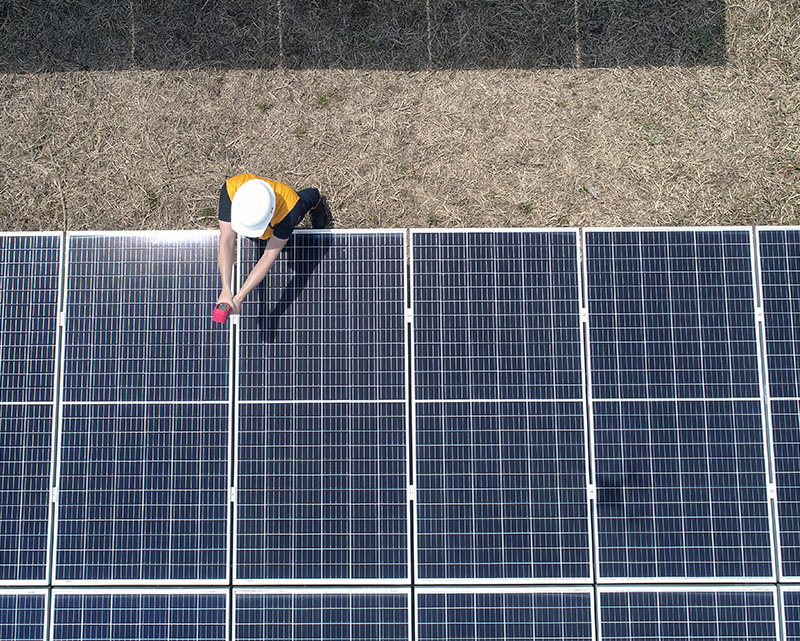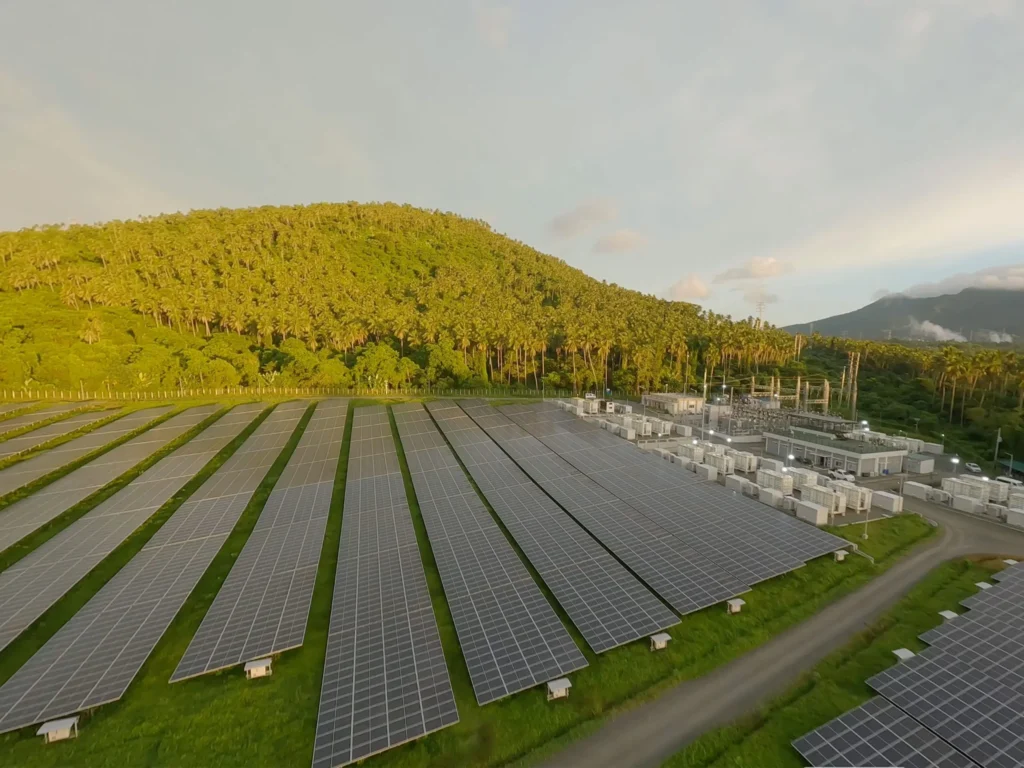As the world accelerates its transition to clean energy, solar power has emerged as one of the most important and scalable solutions. With its potential to reduce carbon emissions and lower electricity costs, it is transforming how communities and businesses power their future.
So, what are the 10 advantages of solar energy? Here’s a closer look at the importance of solar energy and the benefits it delivers for people, businesses and the planet.
What is solar energy?
Solar energy is the process of capturing the sun’s power and converting it into electricity through photovoltaic (PV) panels or other solar technologies. 1Because the sun is an abundant and inexhaustible resource, solar energy is among the most sustainable renewable energy sources in the Philippines.
It produces no emissions, consumes minimal resources and can be scaled from rooftop systems to utility-scale solar farms. Solar energy is a significant part of ACEN’s portfolio, powering communities and creating long-term value for investors and stakeholders.
What are the advantages of solar energy?
Solar energy is a powerful driver of sustainability, delivering clean power, economic benefits and long-term value.
1. Clean and sustainable energy source
The most significant advantage of solar energy is that it is renewable and virtually inexhaustible. Unlike fossil fuels, the sun provides a continuous, abundant supply of clean energy. Harnessing it reduces greenhouse gas emissions, helps mitigate climate change and supports the global shift toward sustainability.
Tapping into renewable energy sources in the Philippines also supports the country’s sustainability goals.
2. Lower energy costs over time
Installing solar panels can reduce the cost of electricity bills. While the initial investment may seem substantial, the long-term savings outweigh upfront costs. In many markets, businesses and households recover their capital within just a few years thanks to reduced utility expenses.
This cost-efficiency is one of the key advantages of solar energy for both individuals and industries. Over the lifespan of solar panels—often 25 years or more—users benefit from predictable and lower energy costs.
3. Energy independence and security
Another critical advantage of solar energy is its ability to reduce dependence on imported fossil fuels. By generating electricity locally, communities and nations strengthen their energy security.
This energy security is particularly valuable for countries vulnerable to price volatility and supply disruptions in global fuel markets. Investing in a solar power company in the Philippines supports resilience against geopolitical and economic risks.
4. Job creation and economic growth
Solar projects are labor-intensive, generating jobs in manufacturing, installation, operation, and maintenance. According to the International Renewable Energy Agency (IRENA), the renewable energy sector employed 13.7 million people globally in 2022, with solar PV being the largest employer.
By expanding solar capacity, companies like ACEN not only accelerate the clean energy transition but also foster inclusive growth by creating opportunities across local communities.
5. Reduced transmission losses
Electricity is often lost as it travels long distances through transmission lines. Solar, however, can be installed closer to the point of consumption, whether on rooftops, commercial buildings or industrial facilities. This localized generation reduces losses and makes the grid more efficient.
This is one practical advantage of solar energy that improves reliability and maximizes available resources.
6. Scalability and versatility
Solar power is highly adaptable, whether deployed in large-scale utility plants or small rooftop systems. This scalability makes it suitable for a variety of applications—from powering remote communities without grid access to fueling entire cities with gigawatts of clean power.
ACEN’s diverse solar projects demonstrate how the technology can be applied at different scales, meeting the needs of both urban centers and underserved rural areas.
7. Technological advancements
Innovation continues to drive down the cost of solar while improving efficiency. Breakthroughs in photovoltaic technology, energy storage and smart grids are making solar more reliable and accessible.
Coupled with digital monitoring systems and hybrid setups, solar power is now more efficient than ever, offering better returns for investors and greater reliability for consumers. These advancements underscore the growing importance of solar energy in modern energy systems.

8. Environmental benefits beyond emissions
The environmental benefits of solar extend beyond reducing carbon dioxide. Solar projects use significantly less water than coal or nuclear plants, conserving resources in water-scarce regions. Additionally, solar farms can be integrated with agriculture (“agrivoltaics”), enabling dual land use while improving crop yields. This initiative is currently being implemented in some of ACEN’s solar farms like in the Philippines, addressing the dual need to transition to renewable energy and increase food supply.
9. Strong alignment with ESG goals
For businesses and investors, one of the top advantages of solar energy is its alignment with Environmental, Social and Governance (ESG) objectives. Adopting solar demonstrates a commitment to climate action, operational efficiency and social responsibility—factors increasingly valued by regulators, customers and financial markets.
As a renewable energy company in the Philippines, ACEN’s solar portfolio plays a central role in attracting sustainable investments and meeting international ESG standards.
10. Long-term value creation
Finally, solar energy represents more than just a utility choice. It’s an investment in long-term resilience. By lowering carbon footprints, reducing exposure to volatile energy prices and enabling innovation, solar strengthens both financial and environmental performance.
For investors, this translates into attractive, future-proof assets. For communities, it means cleaner air, stable power, and opportunities for inclusive growth. For businesses, it’s a strategic decision that positions them as leaders in the low-carbon economy.
Current state of solar energy in the Philippines
The Philippines has a distinct advantage in harnessing solar because of its tropical climate and year-round sunshine. In recent years, the country has expanded its solar portfolio, making renewable energy more accessible while reducing dependence on imported fossil fuels.
ACEN leads these sustainable efforts, placing clean energy at the core of a greener economy. Its key solar projects include:
- SanMar Solar (Zambales, Philippines): One of the largest solar farms in the country built on lahar-covered land, transforming idle terrain into a renewable hub.
- Palauig Solar (Zambales, Philippines): ACEN’s second largest solar farm in the Philippines located in an area with one of the highest irradiance zones.
- Alaminos Solar (Laguna, Philippines): Pilot site for ACEN’s circularity approach during its construction and one of five ACEN’s solar farms that implement the agrivoltaics program.
These initiatives highlight the importance of solar energy in securing a cleaner, more reliable energy future.

Energize the future with solar energy
Solar energy is more than just a renewable source. It is a driver of progress for communities, businesses and the environment.
ACEN is proud to lead this transformation in the Philippines and across Asia Pacific, with solar as a cornerstone of its clean energy strategy. By continuing to scale its projects and advance its roadmap to net zero carbon, ACEN reaffirms its commitment to building a sustainable future for generations to come.
References
- U.S. Department of Energy. (n.d.). How does solar work? Office of Energy Efficiency & Renewable Energy. Retrieved August 28, 2025, from U.S. Department of Energy website: https://www.energy.gov/eere/solar/how-does-solar-work
- Energy Tracker Asia. (2024, June 9). Renewable energy in the Philippines – Current state and future roadmap. Energy Tracker Asia. Retrieved August 28, 2025, from https://energytracker.asia/renewable-energy-in-the-philippines-current-state-and-future-roadmap/
- United Nations. (n.d.). Renewable energy – powering a safer future. United Nations. Retrieved August 28, 2025, from https://www.un.org/en/climatechange/raising-ambition/renewable-energy

